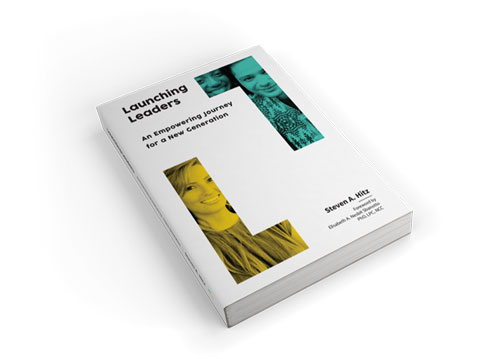 I have had many long conversations with the rising generation regarding money and what we call financial fitness. I have enjoyed being a judge in collegiate entrepreneurial contests and hearing first hand their dreams and aspirations. I have employed more than 10,000 Millennials in my lifetime, and feel I have a special connectedness to their mindset. Millennials have taught us that financial fitness and success in money management cannot be divorced from the concepts of stewardship and giving back.
I have had many long conversations with the rising generation regarding money and what we call financial fitness. I have enjoyed being a judge in collegiate entrepreneurial contests and hearing first hand their dreams and aspirations. I have employed more than 10,000 Millennials in my lifetime, and feel I have a special connectedness to their mindset. Millennials have taught us that financial fitness and success in money management cannot be divorced from the concepts of stewardship and giving back.
Regarding faith and money, the question can be asked, “does God care about how we manage our financial affairs?” The answer is of course a resounding YES. Ironically, those in the rising generation who are leaving active religious practice come from the same generation that is more fully embracing what God has taught us on this topic perhaps more than any other generation.
The rising generation seeks to connect their earning power with doing good in the world. Many say if they don’t recognize the good they are doing in their work they will change venues very quickly to align their purpose with those who are simpatico.
My friend, mentor, and fellow Launching Leaders founder Laurence Day from New Zealand taught me a different way to look at the New Testament’s parable of the talents as it relates to financial fitness. Let me paraphrase slightly his teaching—taken from my book Launching Leaders: An Empowering Journey for a New Generation.
Most people believe a “talent” is more like a skill, but in reality, it is something quite different. In the days of Jesus, a talent was actually a weight—typically a weight of silver that might be worth about $600,000 in our current world. Using this value metric in the parable of the talents, one received $600,000, another $1.2 Million, and the third servant $3 million. The master expected them to double their money in two years. The master didn’t ask them to double their money using other people’s skills, rather, he requested they do so with their own skills.
One servant failed because he was too afraid. Knowing the master was “a hard man,” he became paralyzed by the possibility of losing his money, so he buried it to preserve its value.
The other two servants acted out of faith, not fear, and applied themselves to the task at hand. The parable tells us they “traded” with what they’d been given to increase their talents. In other words, they learned stuff and applied what they learned. They took on risk, applied knowledge and made plans. They probably met failures in their journey, but in the process, learned how to become good stewards. Consider what these two servants had to learn to trade their talents. It probably included trade routes, products, pricing, markups, storage, warehousing, insurance and protection and much more.
The servants who applied the stuff they learned were the ones who made the most of their talents. They became good stewards. This word and principle of stewardship resonates with the rising generation as it has a sacred ring to it. It has to do with living a particular set of ethics and developing a responsible plan for the resources under our care.
I call this the “Mindset of Money.” Within this mindset, I encourage our young adults do the following—which they so naturally gravitate toward anyway:
Discover purpose. In in your quest to be financially fit and fulfill your desires to give back and change the world, you must settle on a framework of purpose and assure your financial goals aligns with that purpose. For the rising generations, how this purpose fits into how the world can be holistic is key.
- Invoke passion behind purpose. This is where life is breathed into the created purpose. If you are not loving what you do, and if this love is not creating passion behind your purpose—then keep working on discovering a purpose that naturally moves the passion forward. In a 2012 Gallup Poll about how people feel about their job, 63 percent were not engaged in their work. 24 percent were actively disengaged. Only 13 percent were engaged. This is because what they were doing did not align with a purpose they believed in. As so much of our lives are taken up by the need to survive and engage in a livelihood, we ought to spend more time analyzing our purpose as it relates to our financial world to assure we experience a joyful passion in what we do. Getting this right ties into so much more than money; it is connected to our physical and mental health and general overall wellness.
- Align livelihood with that purpose. When you have discovered a purpose and the passion for that purpose naturally flows into it, then you align this with a livelihood that makes your path of financial fitness part of your holistic self. You become part of the 13 percent in the world that love what they do.
- Become a great steward of resources. When the purpose, passion and chosen livelihood are also producing income, how you apply these resources (both human and financial capital) is what will make you a great steward. Many in our blessed rising generation are keen on this concept. They would rather live a very modest life and give more of themselves and their resources toward changing the world for the better.
I hope these brief points have stirred a desire to learn more about how to become financially fit, as the two successful servants did in the parable of the talents. Indeed the Lord does care about how we build and manage resources—-and desires us to become good (even great) stewards.
For more granular detail about these concepts of financial fitness, entrepreneurism, and the principles behind them, please see my books Entrepreneurial Foundations For Twenty and Thirty Somethings and Launching Leaders: An Empowering Journey for a New Generation, both available on Amazon.





